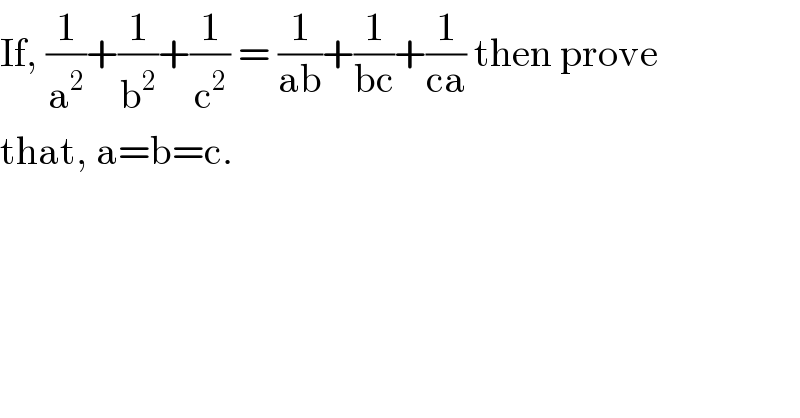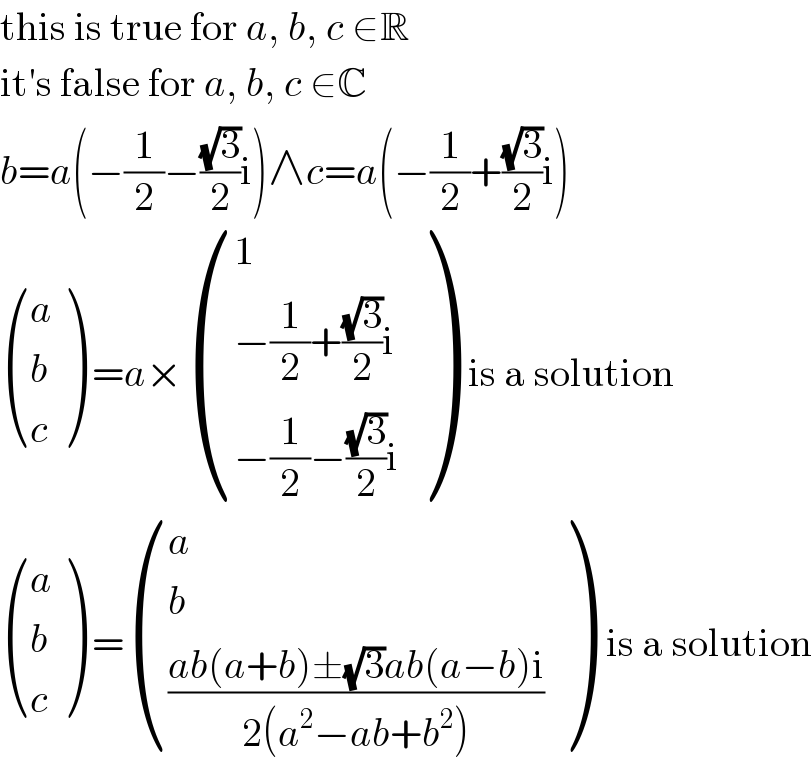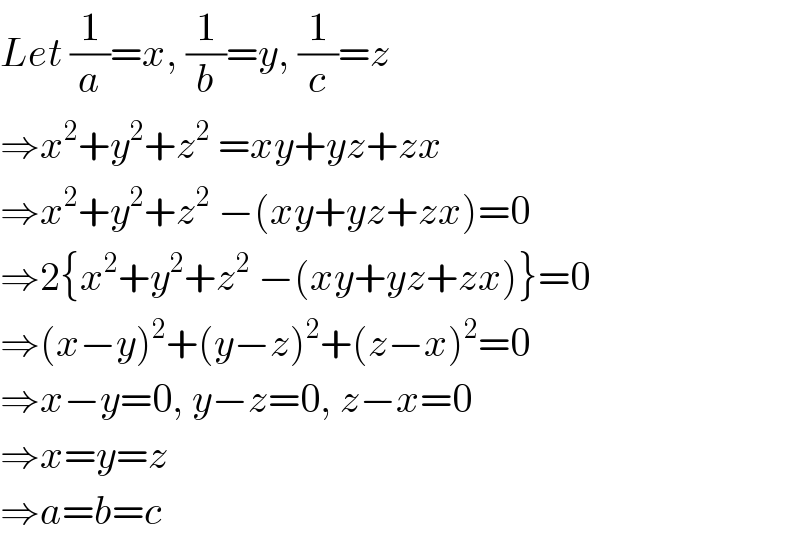Question Number 70312 by Shamim last updated on 03/Oct/19

$$\mathrm{If},\:\frac{\mathrm{1}}{\mathrm{a}^{\mathrm{2}} }+\frac{\mathrm{1}}{\mathrm{b}^{\mathrm{2}} }+\frac{\mathrm{1}}{\mathrm{c}^{\mathrm{2}} }\:=\:\frac{\mathrm{1}}{\mathrm{ab}}+\frac{\mathrm{1}}{\mathrm{bc}}+\frac{\mathrm{1}}{\mathrm{ca}}\:\mathrm{then}\:\mathrm{prove}\: \\ $$$$\mathrm{that},\:\mathrm{a}=\mathrm{b}=\mathrm{c}. \\ $$
Commented by MJS last updated on 03/Oct/19

$$\mathrm{this}\:\mathrm{is}\:\mathrm{true}\:\mathrm{for}\:{a},\:{b},\:{c}\:\in\mathbb{R} \\ $$$$\mathrm{it}'\mathrm{s}\:\mathrm{false}\:\mathrm{for}\:{a},\:{b},\:{c}\:\in\mathbb{C} \\ $$$${b}={a}\left(−\frac{\mathrm{1}}{\mathrm{2}}−\frac{\sqrt{\mathrm{3}}}{\mathrm{2}}\mathrm{i}\right)\wedge{c}={a}\left(−\frac{\mathrm{1}}{\mathrm{2}}+\frac{\sqrt{\mathrm{3}}}{\mathrm{2}}\mathrm{i}\right) \\ $$$$\begin{pmatrix}{{a}}\\{{b}}\\{{c}}\end{pmatrix}\:={a}×\begin{pmatrix}{\mathrm{1}}\\{−\frac{\mathrm{1}}{\mathrm{2}}+\frac{\sqrt{\mathrm{3}}}{\mathrm{2}}\mathrm{i}}\\{−\frac{\mathrm{1}}{\mathrm{2}}−\frac{\sqrt{\mathrm{3}}}{\mathrm{2}}\mathrm{i}}\end{pmatrix}\:\:\mathrm{is}\:\mathrm{a}\:\mathrm{solution} \\ $$$$\begin{pmatrix}{{a}}\\{{b}}\\{{c}}\end{pmatrix}\:=\begin{pmatrix}{{a}}\\{{b}}\\{\frac{{ab}\left({a}+{b}\right)\pm\sqrt{\mathrm{3}}{ab}\left({a}−{b}\right)\mathrm{i}}{\mathrm{2}\left({a}^{\mathrm{2}} −{ab}+{b}^{\mathrm{2}} \right)}}\end{pmatrix}\:\:\mathrm{is}\:\mathrm{a}\:\mathrm{solution} \\ $$
Answered by $@ty@m123 last updated on 03/Oct/19

$${Let}\:\frac{\mathrm{1}}{{a}}={x},\:\frac{\mathrm{1}}{{b}}={y},\:\frac{\mathrm{1}}{{c}}={z} \\ $$$$\Rightarrow{x}^{\mathrm{2}} +{y}^{\mathrm{2}} +{z}^{\mathrm{2}} \:={xy}+{yz}+{zx} \\ $$$$\Rightarrow{x}^{\mathrm{2}} +{y}^{\mathrm{2}} +{z}^{\mathrm{2}} \:−\left({xy}+{yz}+{zx}\right)=\mathrm{0} \\ $$$$\Rightarrow\mathrm{2}\left\{{x}^{\mathrm{2}} +{y}^{\mathrm{2}} +{z}^{\mathrm{2}} \:−\left({xy}+{yz}+{zx}\right)\right\}=\mathrm{0} \\ $$$$\Rightarrow\left({x}−{y}\right)^{\mathrm{2}} +\left({y}−{z}\right)^{\mathrm{2}} +\left({z}−{x}\right)^{\mathrm{2}} =\mathrm{0} \\ $$$$\Rightarrow{x}−{y}=\mathrm{0},\:{y}−{z}=\mathrm{0},\:{z}−{x}=\mathrm{0} \\ $$$$\Rightarrow{x}={y}={z} \\ $$$$\Rightarrow{a}={b}={c} \\ $$
